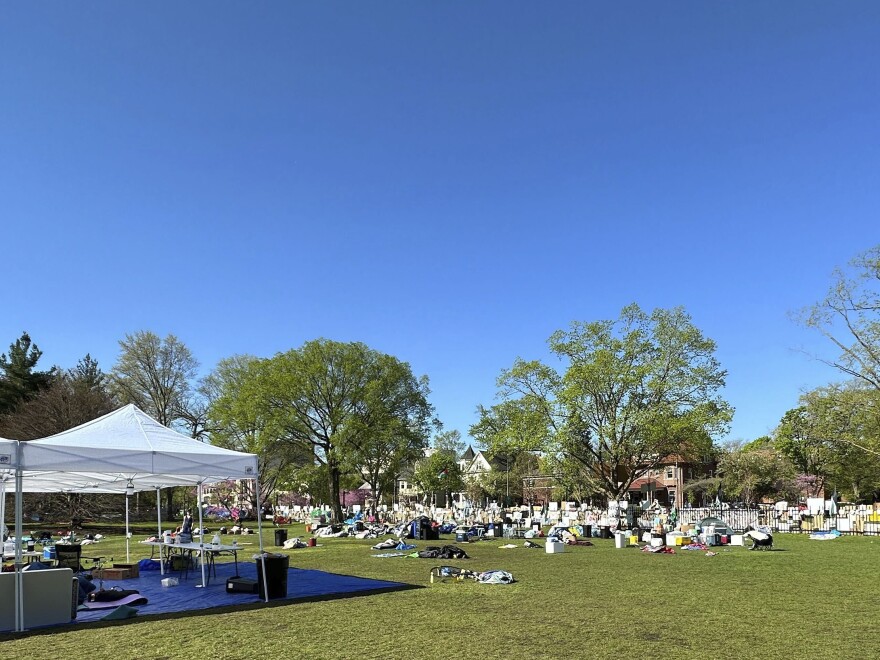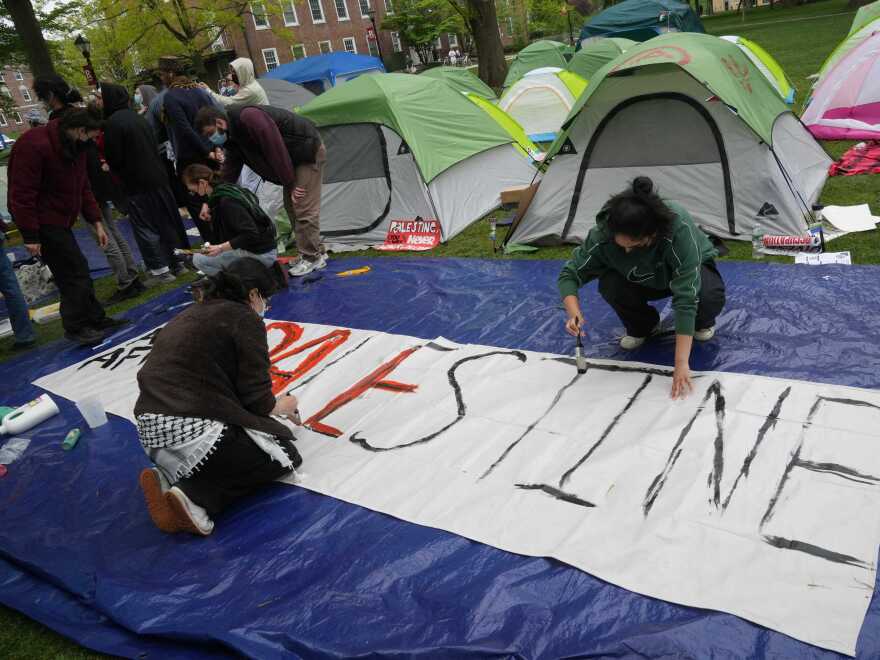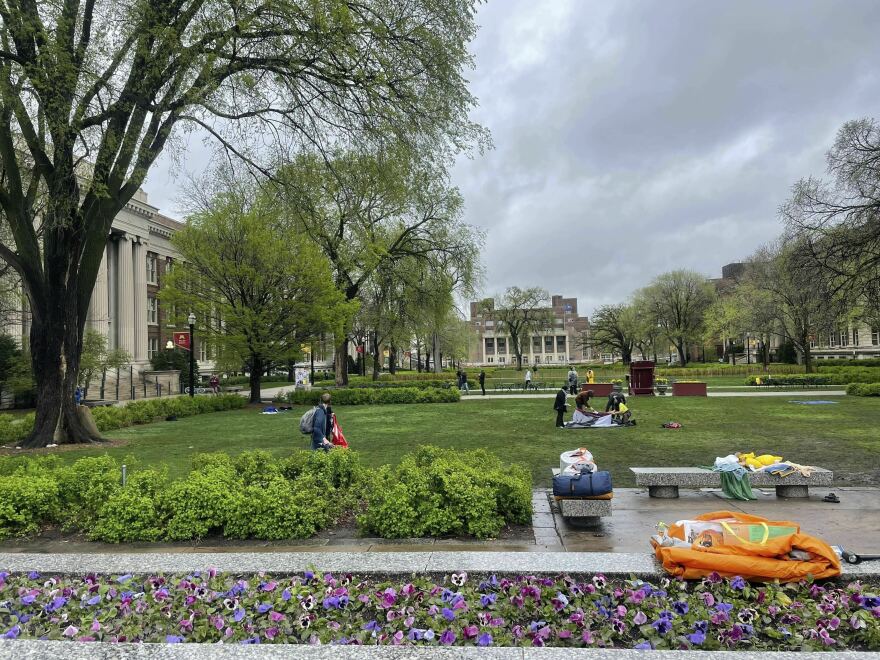As the latest wave of pro-Palestinian demonstrations at U.S. colleges stretches into a third week, some campuses are seeing rising tensions while others have gone relatively quiet.
Administrations at several schools have reached agreements with student protesters, pledging to take certain steps in exchange for the dismantling of protesters' encampments as graduation approaches.
Protesters' demands vary by school, though they generally call for an end to the Israel-Hamas war, disclosures of institutional investments and divestment from companies with ties to Israel or that otherwise profit from its military operation in Gaza.
Northwestern and Brown were the first schools to announce agreements last week, followed quickly by others including Rutgers, Johns Hopkins, the University of Minnesota and the University of California, Riverside.
Some administrations, like those at Columbia University and UCLA, ultimately called in police to forcibly take down student encampments. But others managed to clear their lawns of tents without police intervention — through negotiations with student organizers.
"We thought the best way to sustainably deescalate the situation was to actually talk with our students," Northwestern President Michael Schill told WBUR's Here and Now. "We have a good sustainable agreement which provides a number of things that the students wanted and that we wanted to do."
Northwestern's agreement, for instance, permits peaceful demonstrations — though no tents — through the end of classes on June 1, gives students representation on an investment committee and pledges to bring Palestinian students to campus, among other commitments.
None of the schools outright committed to divest from Israel. But they say they will provide more transparency around their endowments and limit disciplinary action against students, among other commitments. Several also pledged scholarships or aid for Palestinian students and improved space for Muslim students on campus.
Not all activists are satisfied with the terms of their deals, but many are celebrating the agreements as incremental steps in a long-running fight for divestment that, at many schools, far predates Hamas' Oct. 7 attack on Israel and Israel's ensuing response.
"When it comes to the actual momentum that this agreement gives us, I cannot emphasize enough how huge it is," said Lucas, a Northwestern student who asked to only use his first name because of concerns about online harassment.
Some leaders at other schools are now looking to these as an example.
That's the case at Wesleyan University, where President Michael Roth — who previously said the school's encampment could continueas long as it remained peaceful — warned Thursday that vandalism and reports of harassment could result in legal and disciplinary consequences.
"We do not want to move in this direction unless necessary and much prefer to talk with protesters about things we can do as an institution to address the war in Gaza," Roth wrote. "Recent agreements at Brown University and Northwestern University might show the way."
Here's a look at how four schools made it to the bargaining table, and what they're promising protesters next.
Northwestern commits to more student support, though not everyone feels heard

Northwestern's tent encampment lasted for five days before the school reached an agreement with students.
Protesters set up an encampment on Deering Meadow on Northwestern's Evanston, Ill., campus on April 25, to show support for Palestinians and urge the university to disclose — and cut — its financial ties to Israeli companies they say are complicit in the war in Gaza.
The protest drew a large police presence over several days, but attempts by university police to break up the encampment and arrest participants were unsuccessful, in part because faculty members physically blocked their path.
As the protest grew and a sizable pro-Israel counterprotest formed, university leadership engaged in conversations with what they described as a "group of students and faculty who represent the majority of the protestors on Deering Meadow."
On April 29, they announced that they had reached an agreement.
"This agreement was forged by the hard work of students and faculty working closely with members of the administration to help ensure that the violence and escalation we have seen elsewhere does not happen here at Northwestern," university leaders wrote in a note to the community.
The agreement permits peaceful demonstrations on Deering Meadow through June 1, limited to Northwestern community members and no sound amplification devices or tents except for one aid tent. The university also pledged to reestablish its Advisory Committee on Investment Responsibility this fall, with representation from students, faculty and staff.
It will also fund the cost of attendance for five Palestinian undergraduates (and fundraise for more), provide "immediate temporary space for MENA/Muslim students" and engage students in a process to ensure additional support for Jewish and Muslim community members.
Some Jewish groups have taken issue with the terms of the agreement, which they say leaves Jewish students feeling unsafe. Northwestern is now facing two lawsuits, one from students and one from an outside anti-affirmative affirmative action group.
Seven members of the President's Advisory Committee on Preventing Antisemitism and Hate stepped down after the agreement was announced, citing Schill's decision not to consult it during negotiations.
A coalition of outside groups issued a statement calling for Schill's resignation in response to the "reprehensible and dangerous agreement." Separately, the American Jewish Committee accused Northwestern of "succumbing to the demands of a mob which has intimidated Jewish students, espoused antisemitic, hate-filled speech, and whose members have celebrated Hamas terrorists."
Schill, who is Jewish, defended the agreement in an April 30 video in which he acknowledged and condemned incidents of antisemitism at the encampment, including a poster showing him with devil horns, an antisemitic trope. And he told Here & Now that the ban on tents and megaphones aims to make Jewish students feel more safe on campus.
"I do take issue with calling our students a mob," he added. "They're students, they're young, they're sometimes naïve, they're learning — and so the best way for us to engage and achieve our educational mission is for us to engage in dialogue with them."
Several student groups involved in the protest have issued statements of support for the agreement and pledged to keep fighting for a ceasefire and divestment.
In fact, some have already followed up on one promise of the agreement: They've emailed Northwestern requesting more information about its investments in companies with ties to Israel, and are expecting a response within 30 days.
Brown University agrees to a fall vote on divestment, reshaping activists' focus

Brown University President Christina Paxson announced an agreement between the administration and student protesters on April 30, six days after they began their encampment on its Providence, R.I., campus.
"Students agreed to end the encampment and refrain from further actions that would violate Brown's conduct code through the end of the academic year, which includes Commencement and Reunion Weekend," she said.
No protesters were arrested as part of that demonstration, though dozens of students had been arrested in pro-Palestinian, pro-divestment actions earlier this year, including an eight-day hunger strike in February.
Students with the Brown Divest Coalition had two central demands for the university, Isabella Garo told All Things Considered. She was one of the six students involved in negotiations with two administrators.
The first was to present a long-tabled 2020 advisory committee report — recommending divestment from Israeli occupation — to the university corporation for a vote. The second was to drop charges against the 41 students arrested at a December sit-in.
Per the agreement, students cleared out of their encampment by 5 p.m. that day. In exchange, the Corporation of Brown University will invite five students to speak with a group of five of its members — including the chair of the investment committee — about the 2020 report during its May meeting.
It will not add divestment to its May agenda. But separately, Paxson will request an advisory committee provide her with advice on divestment by Sept. 30 and put it on the agenda for the corporation's October meeting.
"I feel strongly that a vote in October, either for or against divestment, will bring clarity to an issue that is of long-standing interest to many members of our community," Paxson said in the announcement.
The agreement also stipulates that students involved in the encampments must go through the university's conduct proceedings, but guarantees that no student will be suspended or expelled for their participation.
Garo said campus responses to the agreement vary.
"Some people are just relieved that there's finally movement in this campaign," she said. "Some people never liked the protests in the first place and are simply relieved the encampment is gone. There's also some people who have expressed some disappointment — they wanted to see divestment outright."
The next step for student activists, she said, is mobilizing in the lead-up to the October corporation. She doesn't know yet what that will look like — and, as a graduating senior, won't be on campus in the fall to help.
"But I'm confident in the ability of my fellow activists to do the work and to do it right," she said.
Rutgers promises a slew of scholarly changes, reaching an 11th-hour agreement

Students and administrators at Rutgers University in New Brunswick, N.J., came to an agreement on May 2.
After a rally that morning forced the school to postpone more than two dozen final exams, it gave protesters a 4 p.m. deadline to take down their encampment — which they set up on April 29 — or else be arrested.
NJ Spotlight News reported that some students prepared to be arrested, setting up a jail support system and readying their phone cameras.
But within an hour of the deadline, the administration offered up a revised proposal — and student organizers accepted it. They began clearing their tents just in time.
Announcing the deal later that day, university officials credited "constructive dialogue between the protesting students and our leadership teams," saying it opened the door for ongoing dialogue to address the needs of its sizable Arab, Muslim and Palestinian student body.
A coalition of student groups advocating for divestment from Israel presented 10 demands to the administration. The school agreed to eight of them but declined to divest from companies doing business in Israel and terminate its partnership with Tel Aviv University.
"Such decisions fall outside of our administrative scope," wrote Chancellor Francine Conway. "However, following our established university policies, the divestment request is under review."
Rutgers did agree to accept 10 displaced Palestinian students on scholarship, develop a plan for an Arab Cultural Center on campus, explore scholarly exchanges with a university in Ramallah and consider creating a Department of Middle East Studies, to name a few.
The agreement doesn't have unequivocal support: The New Jersey regional director of the American Jewish Committee condemned it as "short-sighted" and a "capitulation."
But the Endowment Justice Collective said in an Instagram statement that it was proud of what it had achieved — without student arrests or suspensions — and determined to keep working towards its divestment goals.
"Our decision to end our encampment without achieving these demands reflects our strategic logic regarding building power on campus by laying structural groundwork to not only grow our ranks but shift the political climate across Rutgers," they wrote.
University of Minnesota credits — and plans more — dialogue with students

Protesters at the University of Minnesota Twin Cities campus reached an agreement with the administration on Thursday, capping off a tumultuous few weeks.
Police cleared an antiwar encampment on the day it was set up on April 23, arresting nine people in the process. Students continued to protest, including reestablishing an encampment on April 29 as they called on the school to divest from weapons manufacturers and companies tied to the Israeli military, and to end study abroad programs in Israel.
University officials announced that day that some campus buildings would remain closed amidst protests. A dozen buildings remained closed the following day, as university officials offered to meet with leaders of student groups involved in the protests, MPR News reported.
Organizers met with administrators on Wednesday, the last day before final exams started, and described the conversations as productive. Before the night ended, they had reached an agreement.
Interim President Jeff Ettinger announced the takeaways from the agreement the following day: Campus buildings would reopen at noon, student organizers would not disrupt finals and commencements, and representatives would get an opportunity to address the Board of Regents at its May 10 meeting.
In the agreement, the university provided progress reports on six requests from student protesters, ranging from divestment to amnesty.
Among them: The administration said it would consider setting up program affiliations with Palestinian universities and make a good faith effort to provide information about the university's holding in public companies by May 7, to be supplemented by May 17.
Ettinger credited the meetings with organizers as a "very positive first step in reaching mutual understanding."
He said their original meeting was scheduled for 30 minutes — but the participants "engaged in constructive conversation" for more than 90 minutes, and then met two more times to discuss the proposed agreements.
"We regret that these meetings did not happen sooner, and have committed to regular meetings moving forward to continue to discuss this coalition's concerns," he added.
He said while he is heartened by the initial progress, there is more work to be done. Organizers with the UMN Divest Coalition made a similar vow on Instagram after the agreement was announced.
"We will continue fighting for all 6 of our demands until they are met and continue with full transparency of every step that is taken," they said.
Copyright 2024 NPR



